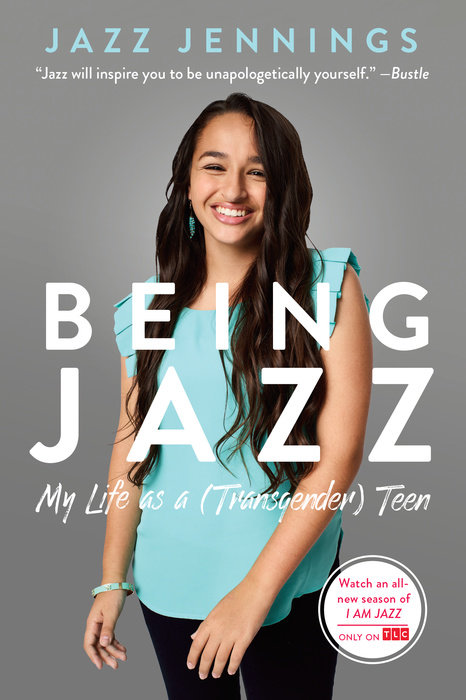Being Jazz
Celebrate Pride every day with the teen advocate, trailblazer, and reality show star Jazz Jennings—one of Time Magazine's "25 Most Influential Teens" of the year. In this groundbreaking memoir, she inspires people to accept the differences in others while they embrace their own truths through sharing her very public transgender journey.
"Jazz is one of the transgender community's most important activists." —Cosmopolitan
"A role model for teens everywhere." —Seventeen
At the age of five, Jazz Jennings’s transition to life as a girl put her in the public spotlight after she shared her story on national television. She’s since become one of the most recognizable and prominent advocates for transgender teens, through her TV show, interviews, and social media.
Jazz’s openness has led to bullying and mistreatment from those who don’t understand her choices. She’s fought for the right to use the girls’ bathroom and to play on a girls’ soccer team, paving the way for others. And in this book, Jazz faces an even greater struggle—dealing with the physical and social stresses of being a teen. But being on the front lines of trans activism doesn't stop Jazz from experiencing the joys of growing up, from day camp to first dates.
Jazz Jennings is one of the youngest and most prominent voices in the national discussion about gender identity. This remarkable memoir is a testament to the power of accepting yourself, learning to live an authentic life, and helping everyone to embrace their own truths.
An Excerpt fromBeing Jazz
Chapter 1
“When is the Good Fairy going to come with her magic wand?”
When did you first know?
I get asked a lot of questions about my life, and that’s the one that comes up the most. The answer is easy. Ever since I could form coherent thoughts, I knew I was a girl trapped inside a boy’s body. There was never any confusion in my mind. The confusing part was why no one else could see what was wrong.
When my mom, Jeanette, got pregnant with me, she was convinced she was going to have a girl. At her baby shower, her friends all crowded around her belly and did the necklace test--that old-timey trick that’s supposed to predict what kind of baby a woman is going to have. You hold a necklace with something heavy attached to it, like a pendant or a ring, over a pregnant belly, and if it swings back and forth it means she’s having a boy. If it moves in a circle, a girl is supposedly on the way.
This witchy little version of a gender-test ultrasound nailed it with every single one of my mom’s pregnancies. It just took a little longer for everyone to realize the fetus fairies actually got it right with me.
When Mom was pregnant with my older sister, Ari, she and my dad, Greg, had just moved to Florida so he could start his law practice. She only had a few new friends at the time, so she didn’t have an official baby shower but still did the necklace test with her pals from Lamaze class. It circled around, and Mom gained a lot of weight (she tells me, mostly in her face and butt). When she got pregnant again with my twin brothers, Griffen and Sander, two years later and had an official shower, the necklace marched back and forth like a little soldier. With the boys, she barely gained any weight. No one could tell she had a bun in the oven if they looked at her from the back, which is especially weird since she had a couple of them in there!
I was a surprise. When my mom first started feeling sick less than a couple of years after the twins, she thought she had the flu. As soon as she realized what was really happening and began putting on tons of weight, she knew she was going to have another daughter even before her friends did the necklace trick for the third time in her life and it spun around in circles like crazy. Everything about the pregnancy was identical to what she had gone through with Ari, so she was completely shocked when the official ultrasound revealed a penis on my body.
My dad didn’t really believe any of the old wives’ tales that my mom was into, but he always smiled and nodded along with what she said. He’s sweet like that. My parents have known each other almost their entire lives--they were neighbors growing up in upstate New York, and met when my mom was five years old and Dad was four! Their fathers were doctors who worked at the same hospital, and their mothers were good friends, but when Mom was little she just thought of my dad as the annoying kid who lived a few houses down, and she wanted nothing to do with him. As he got older he became kind of a troublemaker with a loud mouth, but he finally calmed down around age ten when his parents threatened to ship him off to military school if he didn’t get his act together.
All the time my mom was ignoring him, Dad had a crush on her from afar, despite knowing they weren’t each other’s type. He’d sneak glances at her at the local pool, and when they were older and in high school he even loaned her his jacket one night when he saw her shivering at a soccer game.
They didn’t get together until years later when Dad’s brother proposed to one of Mom’s friends. My mom’s parents were invited to the engagement party along with Mom, and both of their mothers sat Mom and Dad down at a table to look over a photo album with pictures of the spot in Europe where the proposal had happened. One by one, everyone got up from the table and left, leaving Mom and Dad alone. Mom was impressed that he’d finally shaved off the mustache she’d never liked, and it was obvious he had been working out--he no longer looked like the scrawny kid next door. They went on their first date that very same night after the party ended, and saw Bride of Chucky--the fourth and most romantic installment of the Child’s Play killer doll film franchise. The movie must have worked its magic, because they moved in together not long after. When Dad got into law school in Columbus, Ohio, Mom agreed to move there with him, but only if he proposed first. So he did!
When I finally came along seven years later, they named me Jaron--a compromise between Jordan and Aaron. Dad was pushing hard for Jordan, but my mom had once dated a guy with that name, so she shot that down. For a while they settled on Owen, but then they switched to the Jordan and Aaron combo. It was conveniently gender neutral, which would come in very handy down the road.
As I began to grow, my family thought my obsessive interest in girly things was just a normal developmental phase. I have really strong memories of the emotions I felt before I could speak, as well as my actions--I figured out how to undo the snaps on my onesie to turn it into a dress shortly after I began to walk.
Like any kid, I took a lot of baths with my brothers and sister, and I’d compare my genitals to theirs. My little penis felt so wrong on me. I wished I could take the sponge and wipe it off, and behind it I’d magically find a “gagina” like what my sister and my mom had. It definitely bothered me, but I remember feeling frustrated and confused more than anything else. It was a strange growth hanging off me that didn’t look at all like it belonged there.
When I finally did start to talk, I’d say “dwess like Awee” to my mom every time she put clothes on me. She misunderstood, thinking I was trying to show off my independence and letting her know that I could dress myself just like my older sister did.
I get why she would have assumed that at first. I was an extremely self-reliant toddler. Here’s a good example of just how in control I liked to be: At night, I slept with a pair of blankets, each covered with the same Noah’s Ark print of animals marching two by two. I liked to keep my temperature perfectly regulated while I slept, so I’d cover up with one blanket and keep the other by my side. I’d wake up as soon as I got too warm and immediately switch the covers, pulling the cooler one over me, the way most people flip their pillow on a hot summer night. I’d continue switching the blankets all night long, barely waking myself up in the process. I wasn’t going to settle for anything less than what made me the most comfortable. And during the day, what made me comfortable was wearing a dress.
Around the house, I was pretty much allowed to wear whatever I wanted. I’d steal Ari’s oversize pink or purple T-shirts and wobble around the kitchen in dress-up heels covered in feathers. (In fact, I first started wearing those heels back when I was still in diapers.) My parents were cool about it but drew the line at going out in public dressed in girls’ stuff. Mom would put me in shorts styled for boys, and I’d scream and cry as she dragged me to the car. I didn’t just like girly clothing--I felt ashamed and humiliated if I had to wear anything else.
Sometimes it helps people understand the feeling better if I put it like this: Imagine a young boy who is super into trucks and cars and playing in the mud. Then imagine that every time his parents take him out in public, they parade him around in a pink frilly dress with a parasol. The humiliation he’d feel is exactly the same humiliation I felt having to wear plain shorts and a T-shirt. I couldn’t understand why my parents, who were as loving and caring as anyone could hope for, would force me to go through that kind of torture.
The more words I learned, the more I started to verbalize my feelings. Whenever my mom or dad would compliment me by saying something like “Good boy,” I’d immediately correct them.
“No. Good girl.”
When I was around two years old, I had what I now refer to as the Good Fairy dream. After a long morning of playing with Ari’s dolls, dressing them up and staring enviously at the smooth area between their legs, I took a nap in my sister’s bed. I had no idea that I was asleep--the world seemed crystal clear as a grown woman wearing a blue gown floated into the room. She wasn’t quite like the imaginary creatures you see in cartoons, but I knew instinctively that she was a fairy, thanks to her gossamer wings, the glowing light all around her, and the magic wand that suddenly appeared in her hand. Other than those fantasy details, she looked and acted like an adult, full of purpose and authority.
I don’t remember her exact words, or even if she spoke out loud at all, but I knew why she was there. She promised to use her wand to turn my penis into a vagina.
I was ecstatic when I woke up. I felt like all the answers to my prayers were possible. The dream had felt so true, so real, that I knew it was just a matter of time before the fairy would appear again and do what she’d said she could do.
I ran downstairs and found my mother sitting in our living room.
“When is the Good Fairy going to come with her magic wand?” I asked.
“The who?”
“The Good Fairy, who will turn my penis into a vagina!”
My mom tells me now that this was a huge turning point for her, the first time she truly began to realize that what I was going through probably wasn’t a phase. I remember being crushed when she said no fairy was going to come for me. I had been filled with so much hope when I’d woken up, and it was destroyed within a matter of minutes.
In response, I started to assert myself even more. My mom’s parents, Grandma Jacky and Grandpa Jack, were visiting us from New York not long after I had the Good Fairy dream. (They’ve since moved down here to Florida full-time.) While I don’t remember this specific moment, they tell me they were sitting in the living room when I marched down the stairs wearing a flouncy pink dress with a pink feather boa wrapped around my neck, along with my dress-up heels and loads of costume jewelry weighing down my wrists and fingers.
“My oh my,” Grandpa Jack said.
Grandma Jacky tells me that I got to the bottom stair, sat down, crossed my legs like a proper little lady, and just stared at them. She says she knew it was a declaration, and that I was definitely looking for some sort of reaction as I searched their eyes for approval. For her, the realization that something was different about me came less from what I was wearing and more from the way I was sitting and my body language.
During Grandma Jacky’s visits, I’d do things like put on a blond wig and a bra over my clothes while brushing my mom’s hair. One day when Grandma Jacky took me shopping and she told me I could pick out a toy, I headed straight to the Barbie aisle. In my child’s mind I remember it as a wall of pink that seemed to go right to the top of the ceiling and stretch the length of the store in either direction. I was allowed to pick a doll instead of the G.I. Joe figure Grandma Jacky knew I wouldn’t want anyway.
That didn’t stop her from trying to get me to play with boy toys. I had no idea that she’d call Ari and ask her to get me interested in toy trucks, to which Ari would reply, “Oh, Grandma,” with an eye roll practically visible through the phone. My siblings simply didn’t care. They didn’t get why anyone thought what I liked was a big deal.
Grandma Jacky wasn’t going behind my back to be malicious. She was worried about how the world might treat me. She was also worried about my mom, who was growing more and more concerned about my behavior. Mom has a master’s degree in clinical counseling, so she decided to start doing some research in her copy of the Diagnostic and Statistical Manual of Mental Disorders about what I was experiencing.
The DSM is a huge book that lists all the different mental conditions known to the medical world. It gets revised and updated as doctors learn more about mental health, and back then the most current version still included something called gender identity disorder. The word “disorder” has a negative connotation that’s pretty offensive to transgender people. (The same manual used to list being gay as a disorder, too.)
My mom read the DSM checklist to see if I fit the criteria for this so-called disorder and kept her own tally in her head.
Does he insist that he is the other sex? Yes.
Does he prefer to wear girls’ attire? Yes, oh yes.
Does he fantasize about being the other sex and cross-dress during make-believe? All the time, YES.
Does he have an intense desire to participate in the stereotypical games and pastimes of the opposite sex? Yep.
Does he have a strong preference for playmates of the other sex? Only plays with girls, YES!
It wasn’t like Mom had never heard of someone being transgender. She had a general understanding of what it meant, as did Grandma Jacky. It had just never occurred to them that a kid could know with so much certainty at such a young age. Mom took all this information to my pediatrician, who, after giving her a pretty concerned look, recommended that we visit a child psychologist. The pediatrician gave Mom a referral, but after doing a little research, Mom discovered that the recommended psychologist didn’t specialize in kids with gender identity disorder. She did manage to find a psychologist named Dr. Sheryl Brown who treated transgender adults, and who confirmed Mom’s suspected diagnosis of me. But Dr. Brown didn’t feel comfortable taking me on as a patient, since she had no experience treating someone as young as I was. That freaked my parents out, since it was starting to seem like no one had ever treated a kid my age with GID. My mom’s cousin Debbie, who was a licensed mental health counselor (and would later go on to get a doctorate in counseling transgender youth because of me), finally introduced them to Dr. Marilyn Volker, a therapist who worked with both gender issues and kids.



